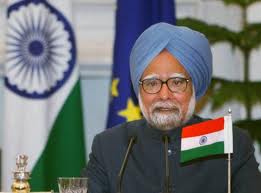
Bathinda (Punjab), April 29: Despite key Congress allies opposing deregulation of diesel prices, Prime Minister Manmohan Singh on Saturday stressed the need to rationalize fuel prices as spiralling cost of international crude severely impacts India's import bill.
Inaugurating a nine-million tonne a year refinery here, the PM said imports account for about 80% of India's crude supplies and "we need to rationalize prices and at the same time ensure that the poor and needy are shielded from the effects of such rationalization."
Despite his caveat on protecting the vulnerable, Singh's remarks point to likely increases in petrol and diesel prices if he does bite the bullet, despite the Nationalist Congress Party and the Trinamool Congress opposing the "in principle" decision to deregulate diesel prices.
The voluble allies have promised to protest the move with the NCP planning rallies in Delhi and TMC chief Mamata Banerjee instructing party MPs to voice the party's opposition. Trinamool parliamentary party leader Sudip Bandhopadhyay has said the party will not support diesel price deregulation.
Fuel subsidy accounted for 3.4% of government spending amounting to Rs 41,000 crore in 2010-11, and the forecast for international crude prices indicates costs will remain high. Under recoveries of oil companies amounted to Rs 138,406 crore in the financial year 2011-12. With the government straining to control the fiscal deficit, the pressure to increase fuel prices is growing.
PM tests ground for fuel hike
The Prime Minister on Saturday may have hinted at the need to rationalize fuel prices but key allies like Trinamool and NCP are unlikely to accept such a move. TMC chief Mamata Banerjee, given her "pro-people" stance - she even sacked her own railway minister to stymie a bid to raise rail fares - will certainly not support a hike in fuel prices. It remains to be seen if she will put her foot down or limit herself to protests. If NCP and TMC team up they can create a serious hurdle for the government and PM's comments seem intended to test the waters.
Besides allies, opposition groups are certain to criticize fuel hikes on the ground that they add to the burden on the aam aadmi and spur inflation.
The PM said "the challenges we face on the energy front are formidable. We need adequate supplies of energy at affordable prices. Domestic sources of crude oil and gas are inadequate to meet the growing demands of our rapidly expanding economy."
Suggesting that the oil subsidy bill was getting out of hand, Singh said "In order to insulate the common man from rising oil prices, the government shoulders a sizeable portion of the burden by pricing diesel, kerosene and domestic LPG below their market prices."
"We need to adopt better technology and consumers should be made aware of the benefits of fuel conservation," said the PM.





Comments
Add new comment